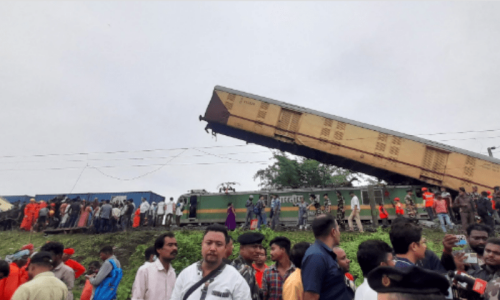NEW DELHI, June 28: Pakistan and India sealed their first round of talks on Kashmir on Monday with a warm embrace and a promise that they will work relentlessly to find acceptable solutions to all problems , including Jammu and Kashmir, peacefully.
The tone for Monday's talks was set by Indian Prime Minister Manmohan Singh himself, who received Pakistan's Foreign Secretary Riaz Khokhar and his team and assured them of his personal support for their efforts to work for peaceful solutions to all bilateral disputes.
"The prime minister is a gracious man," said foreign office spokesman Masood Khan. "He received our delegation with warmth. He expressed support for a serious and sustained dialogue with Pakistan.
He said that India would sincerely pursue the dialogue process to find acceptable solutions to all issues, including Kashmir." Reports said the Indian prime minister handed a message to Mr Khokhar for President Pervez Musharraf.
The Pakistani delegation also reported productive and positive meetings with Foreign Minister Kunwar Natwar Singh and National Security Adviser Jyotindra Nath Dixit. Mr Khan told reporters after the meetings that the political leadership on both sides was taking the lead to create a positive outlook to enable the dialogue to move forward.
"There is of course the wider realization on both sides that peace is the only path, and that recourse to war to find solutions was unthinkable in today's context." A joint statement issued before Mr Khokhar's departure for Islamabad went pretty much along the expected lines, spelling out some confidence-building measures and promising to work towards several more.
Mr Masood Khan, who addressed a news conference at the Pakistan High Commission, flatly denied suggestions that Pakistan was helping train or arm anti-Indian Kashmiri groups on its side of the Line of Control.
"These are attempts at disinformation, aimed at harming the dialogue process," he declared. "Pakistan is itself committed to fighting all forms of terrorism and religious extremism."
Mr Khan also defused the enthusiasm of those who sought to read deeper meaning into a reference to the United Nations Charter along with the Shimla Agreement in the joint declaration.
"The UN Charter was mentioned in the Shimla Agreement of 1972 as well. So what do we gather from that?," he retorted. The following is the text of the joint statement:
1) The foreign secretaries of India and Pakistan met in New Delhi on June 27-28, 2004, to resume the composite dialogue. They discussed 'Peace and Security including CBMs' and 'Jammu and Kashmir'. The talks were held in a cordial and constructive atmosphere, and with the objective of taking the process forward.
2) They reiterated their commitment to the principles and purposes of the Charter of the United Nations, and their determination to implement the Shimla Agreement in letter and spirit.
3) Both sides expressed satisfaction over the ongoing process of dialogue and confidence-building between the two countries. They approved the measures recommended by the expert-level meeting on nuclear CBMs in New Delhi on June 19-20, 2004.
They agreed to conclude an agreement on pre-notification of flight-testing of missiles, and entrusted the experts to work towards finalizing the draft agreement.
Both sides reaffirmed the elements in the joint statement of June 20 on the need to promote a stable environment of peace and security, recognizing the nuclear capabilities of each other constituting a factor for stability, working towards strategic stability, and the call for regular working level meetings to be held among all the nuclear powers to discuss issues of common concern.
The two sides proposed a comprehensive framework for conventional CBMs aimed at initiating and enhancing communication, coordination and interaction. These would be discussed further.
4) Recalling the reassurance contained in the joint press statement of Jan 6, 2004, they exchanged views on carrying the process forward in an atmosphere free from terrorism and violence.
5) The foreign secretaries reiterated the hope that the dialogue would lead to peaceful settlement of all bilateral issues, including Jammu and Kashmir, to the satisfaction of both sides.
They held detailed exchange of views on Jammu and Kashmir and agreed to continue the sustained and serious dialogue to find a peaceful negotiated final settlement.
6) It was agreed that the strengths of the respective high commissions would be restored immediately to the original level of 110; it was also agreed in principle to re-establish India's consulate general in Karachi and Pakistan's consulate general in Mumbai.
Modalities would be worked out by the two governments. All apprehended fishermen in each other's custody would be immediately released and a mechanism put in place for the return of unintentionally transgressing fishermen and their boats from the high seas without apprehending them. Steps would be initiated for early release of civilian prisoners.
7) The foreign secretaries also agreed that the meetings of the remaining six subjects of the composite dialogue on Siachen, Wullar Barrage/ Tulbul Navigation Project, Sir Creek, terrorism and drug trafficking, economic and commercial cooperation, and promotion of friendly exchanges in various fields, would take place between the third week of July and the first half of August 2004.
8) The foreign secretary of Pakistan conveyed invitations from the president of Pakistan to the president and prime minister of India, and to Mrs Sonia Gandhi.
9) The foreign secretaries will meet again in the third week of August to review progress achieved in the composite dialogue and prepare for the meeting of the foreign ministers which will immediately follow.










































Dear visitor, the comments section is undergoing an overhaul and will return soon.